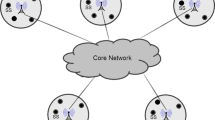Abstract
WiMAX distributed scheduling can be modeled as two procedures: three-way handshaking procedure and data subframe scheduling procedure. Due to manipulating data transmission directly, data subframe scheduling has a closer relationship with user Quality of Service (QoS) satisfaction, and has more severe impact on network performance, compared with handshaking procedure. A QoS guaranteed Throughput-Efficiency Optimal distributed data subframe Scheduling scheme, named as QoS-TEOS, is proposed. QoS-TEOS achieves QoS guarantee through modeling services into different ranks and assigning them with corresponding priorities. A service with higher priority is scheduled ahead of that with lower priority and offered with high QoS quality. Same kinds of services that request similar QoS quality are classified into one service set. Different service sets are scheduled with different strategies. QoS-TEOS promotes network performance through improving network throughput and efficiency. Theoretical analysis shows that the scheduled data transmission should balance data generation rate from upper layer and transmission rate of physical layer, to avoid network throughput and efficiency declining. Simulation results show that QoS-TEOS works excellently to achieve throughput-efficiency optimization and guarantee a high QoS.
Similar content being viewed by others
References
IEEE standard for local and metropolitan area networks — Part 16: Air interface for fixed broadband wireless access systems. IEEE Standard 802.16-2004, Oct. 2004.
IEEE recommended practice for local and metropolitan area networks — Coexistence of fixed broadband wireless access systems. IEEE Standard 802.16.2-2004, 2004.
IEEE standard 802.16 — Comment contribution. http://wirelessman.org/tga/contrib/C80216a-02_30r1.pdf
Kabbani A, Salonidis T, Knightly E W. Distributed low-complexity maximum-throughput scheduling for wireless backhaul networks. In Proc. INFOCOM 2007, Anchorage, USA, May 6-12, 2007, pp.2063–2071.
Sharma G, Shroff N B, Mazumdar R R. Joint congestion control, routing, and MAC for stability and fairness in wireless networks. IEEE Journal on Selected Areas in Communications, 2006, 24(8): 1514–1524.
Brar G, Blough D M, Santi P. Computationally efficient scheduling with the physical interference model for through-put improvement in wireless mesh networks. In Proc. MobiCom 2006, Los Angeles, USA, Sept. 23-29, 2006, pp.2–13.
Chaporkar P, Proutiere A. Adaptive network coding and scheduling for maximizing throughput in wireless networks. In Proc. MobiCom 2007, Montreal, Canada, Sept. 9-14, 2007, pp.135–146.
de Baynast A, Gurewitz O. Cooperative strategies and optimal scheduling for tree networks. In Proc. INFOCOM 2007, Anchorage, USA, May 6-12, 2007, pp.1857–1865.
Andrews M, Zhang L. Scheduling algorithms for multi-carrier wireless data systems. In Proc. MobiCom 2007, Montreal, Canada, Sept. 9-14, 2007, pp.3–14.
Deb S, Mhatre V. WiMAX relay networks: Opportunistic scheduling to exploit multiuser diversity and frequency selectivity. In Proc. MobiCom 2008, San Francisco, USA, Sept. 14-19, 2008, pp.163–174.
Deng D J, Chang L W, Ke C H, Huang Y M, Chang J M. Delay constrained uplink scheduling policy for rtPS/ertPS service in IEEE 802.16e BWA systems. International Journal of Communication Systems, 2009, 22(2): 119–133.
Maltsev A A, Pudeyev A V. Multi-user frequency domain scheduling for WiMAX OFDMA. In Proc. the 16th IST Mobile and Wireless Communications Summit, Budapest, Hungary, July 1-5, 2007, pp.1–4.
Wei H, Ganguly S, Izmailov R, Haas Z. Interference-aware IEEE 802.16 WiMax mesh networks. In Proc. the 61st IEEE Vehicular Technology Conference, Stockholm, Sweden, May 30-Jun. 1, 2005, pp.3102–3106.
Cao M, Ma W, Zhang Q, Wang X, Zhu W. Performance analysis of the distributed scheduler in IEEE 802.16 mesh mode. In Proc. MobiHoc 2005, Urbana-Champain, USA, May 25-27, 2005, pp.78–89.
Zhang Y, Zheng J, Li W. A simple and effective QoS differentiation scheme in IEEE 802.16 WiMAX mesh networking. In Proc. WCNC 2007, Hong Kong, China, Mar. 11-15, 2007, pp.3218–3222.
Bayer N, Sivchenko D, Xu B, Rakocevic V, Habermann J. Transmission timing of signalling messages in IEEE 802.16 based mesh networks. In Proc. European Wireless Conference 2006, Athens, Greece, Apr. 2-5, 2006, pp.108–115.
Bayer N, Xu B, Habermann J, Rakocevic V. Improving the performance of the distributed scheduler in IEEE 802.16 mesh networks. In Proc. IEEE Vehicular Technology Conference (VTC 2007-Spring), Dublin, Ireland, Apr. 22-25, 2007, pp.1193–1197.
Makarevitch B. Distributed scheduling for WiMAX mesh network. In Proc. PIMRC 2006, Helsinki, Finland, Sept. 11-14, 2006, pp.1–5.
Makarevitch B. Jamming resistant architecture for WiMAX mesh network. In Proc. MILCOM 2006, Washington DC, USA, Oct. 23-25, 2006, pp.1–6.
Teng D, Yang S, He W, Hu Y. TEOS: A throughput-efficiency optimal distributed data subframe scheduling scheme in WiMAX mesh networks. In Proc. WiCOM 2008, Dalian, China, Sept. 12-25, 2008.
Author information
Authors and Affiliations
Corresponding author
Additional information
Supported by Intel Project under Grant No. 4507336215; Huawei Project under Grant No. YBCB2007025 and the University of Science and Technology of China Innovation Foundation under Grant No. KD2008053.
Rights and permissions
About this article
Cite this article
Teng, D., Yang, SB., He, WQ. et al. QoS-TEOS: QoS Guaranteed Throughput-Efficiency Optimal Distributed Scheduling in WiMAX Mesh Networks. J. Comput. Sci. Technol. 25, 970–981 (2010). https://doi.org/10.1007/s11390-010-9381-6
Received:
Revised:
Published:
Issue Date:
DOI: https://doi.org/10.1007/s11390-010-9381-6




